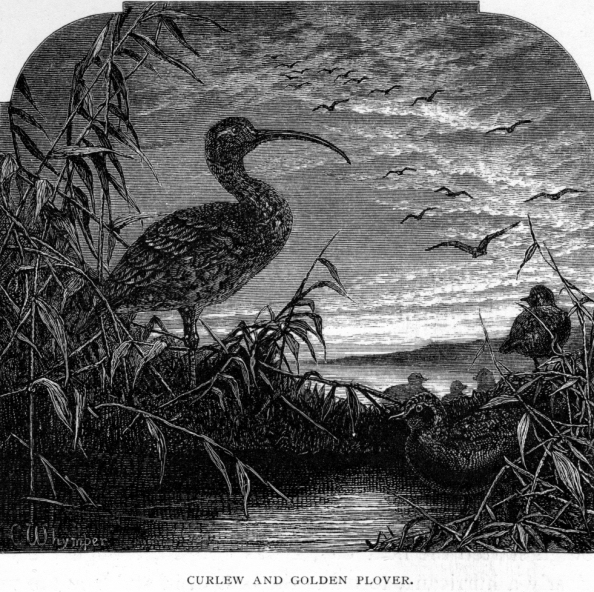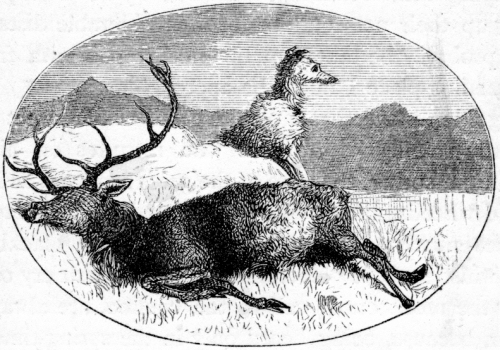|

Variety of Game.
The list of game killed by
my own gun on the 21st of October, appears in my game-book to have been as
follows:—
Grouse 6
Partridge 13
Woodcock 1
Pheasant 1
Wild Duck 1
Snipe 4
Teal 1
Curlew 3
Plover 4
Jacksnipe 2
Hare 5
Rabbit 2
Though the number of
animals in this list may not seem great to many of my sporting friends in
England and Scotland, a prettier variety of game could scarcely be killed
by one gun in any single locality, and the whole of them were shot during
a few hours' walk, and in a most stormy and windy day. I had promised to
send a hamper of game to a friend in Edinburgh, and knowing that he would
prize it more if I could make up a variety than if I sent him double the
quantity of any one kind, I determined to hunt a wild part of my
shooting-ground, where I should have a chance of finding ducks, snipes,
etc.
I started after breakfast
with a single pointer, and my everlasting companion, an old retriever. As
the steam-boat for Edinburgh started the next day, I was obliged, though
the wind blew nearly a hurricane, to make the best of it, and face the
wind in the dreary and upland ground, which I had determined to beat, and
where I had sent an attendant to meet me.
Passing over a long tract
of furze and broom, I killed a couple of hares, and drove some partridges
off down to windward; but as they flew quite out of the direction in which
I meant to shoot, I did not follow them. My pointer stood immediately on
getting into an extensive piece of grazing-ground; his head high up showed
me that the birds were at some distance. He drew on for some two or three
hundred yards, when two large covies of partridges rose, and, unable to
face the wind, drifted back over my head like leaves. Bang, bang — and a
brace of them fell dead sixty yards behind me, though shot when nearly
over my head, and killed at once. I marked down the rest, and got a brace
more, when they went straight away, as if determined to make their next
resting-place somewhere about Norway. But my line was to windward still,
in order to hunt some ground where there was a chance (though a bad one)
of a brace or so of grouse.
Picking up a snipe or two,
and a hare, I worked up hill against the wind along a tract of wild
heather and pasture-ground. In the midst of this was a small peat-bog,
and, when passing it, I flushed a brace of mallards, who, after drifting
about and trying to. make their way to the sea, turned and alighted in a
swampy piece of ground, where there were some small pools. By their manner
I was sure that they had some companions where they alighted, so desiring
the man who accompanied me to hold the pointer, I tried to stalk
unperceived to the spot where they were, allowing my old retriever (who
was well accustomed to duck-shooting) to accompany me. I had got to within
a hundred yards, when an old mallard, whom I had not seen, rose at my feet
out of a pool, and quacked an alarm that made six more rise out of shot of
me. I avenged myself, however, on him, bringing him down quite dead at a
considerable distance. Several pairs of ducks rose at the report, and all
went off to the sea.
I had scarcely commenced
hunting again with the pointer, when he stood at something close to his
nose, stopping dead short in the midst of his gallop. I walked up,
expecting a jack-snipe; when, out of a small hollow, or rather hole in the
heather, rose eight grouse. They flew wild, but I killed one with my first
barrel, and two with the second — the wind blowing them up into a heap
just as I pulled the trigger: the rest flew over a height not far up,
right in the eye of the wind. I knew the violence of the gale must stop
them; and accordingly I found them again, immediately over the ridge, and
killed a brace more, marking down the rest close to a cottage. My next two
barrels killed one only. The rest went off a long distance. The star of my
friend's larder was still in the ascendant, for before I turned to beat
homewards I killed two jacksnipes; thus making up four partridges, six
grouse, four snipes, three hares, and a wild duck. Not a bad bag already.
I beat on towards the coast, killing some partridges, a brace of rabbits,
a woodcock, and a hare or two.
Near the shore I saw an
immense flock of curlews and other birds in a tolerably good situation for
getting near them. Of all shore-birds there is none, not even the wild
duck, so difficult of approach as a curlew. With the most acute sense of
hearing, their organs of smelling are so sensitive, that the moment you
get "betwixt the wind and their nobility" they take wing, giving the alarm
by their loud shrill whistle to every other bird within hearing. I got,
however, unperceived to within forty yards of them, and having loaded one
barrel with a cartridge, I fired right and left at the flock.
There was a rare confusion
and scuffling amongst them, and my retriever brought me, one by one, three
curlews and four golden plovers. Some other birds dropped here and there
out at sea, but I could only get the above number. A brace of teal rose at
the shot and alighted in a ditch in the adjoining field; so, loading
quickly, I walked to the place : as they rose rather wild, I only bagged
one, the other bird going away hard struck. I then followed the course of.
the rushy ditch, or rather rivulet, which led towards my house, having
already a fair quantity of game. My dog pointed, and I killed a snipe; I
did not reload the barrel, as I was near home, but hunted on along the
rushes, expecting another snipe to present my remaining charge to. The dog
presently stood, and then drew slowly on till he came very near to the end
of the rushes, when he pointed dead at something close to him. I walked
about the rushes, but could find nothing, till, just as I was giving it
up, a magnificent old cock pheasant, who had wandered away from the woods,
rose in a furrow of the field adjoining the rushes. He was rather far off,
but I killed him dead, making as pretty a climax or tail-piece to a day's
wild shooting as I could have wished; and though I have very often far
exceeded the number which I killed that day, I do not ever remember
bagging a handsomer collection of animals in so short a time. Every bird,
too, was in beautiful plumage and condition, and when laid out, ready to
be packed up, made quite a picture.
An account of a day's
shooting is rather a dry affair, but I have given it as showing the great
variety of game which is to be found in this part of the country. I had,
indeed, as good a chance of killing a roebuck as anything else, as I
passed through a piece of ground where I have repeatedly killed roe. I saw
an old blackcock too, but he was in a bare place, and rose out of shot.
Golden plovers and curlews
collect on the low grounds in immense flocks at this time of the year,
previous to settling down in their winter-quarters. Both these birds breed
generally in very high situations, and though wary in the winter, and
difficult to approach, yet during the summer, when crossing the mountains,
I have been absolutely annoyed by the continued clamour of curlews flying
and screaming within a few yards of my head, and following up their
persecutions for a considerable distance, when it would probably be taken
up by another pair with fresh lungs, whose breeding-place I might be
approaching.
The golden plover has a
plaintive and rather sweet note as he flits rapidly round the traveller
who intrudes on his domain. Indeed, in the spring, the note of the golden
plover, as he ascends with rapid wheelings high above your head, is quite
musical, and approaches nearly to the note of a thrush or blackbird. Not
only the whistle of the plover, but even the harsh cry of the landrail,
and the monotonous call of the cuckoo, are always grateful to my ear,
because, being heard only in the spring-time, they are associated in my
mind with the idea of the departure of winter and the return of fine
weather. It is often a matter of astonishment to me how the throat of a
bird so tender and delicately formed as the landrail can emit such hard
and grating cries, which sound more as if they were produced by some iron
or brazen instrument than from the windpipe of a bird. The raven or crow
look as if they ought to be the owners of a harsh and croaking voice, and
a shrill note comes appropriately from the throat of a barn-door cock ;
but a landrail appears to be a bird quite unfitted to produce a sound like
that of a piece of iron drawn along the teeth of a rusty saw. There is a
way of imitating their cry so exactly, as to bring the bird to your feet,
but I never could succeed in doing so, or indeed in making it answer me at
all, though I have tried the plan which I was told was infallible, of
drawing the edges of two horse's ribs against each other, one of them
being smooth and the other notched like a saw. Although the fields were
swarming with the birds at the time, I never succeeded in persuading even
a single one to answer me.
 |

